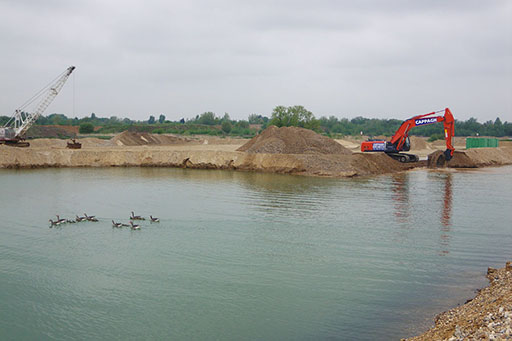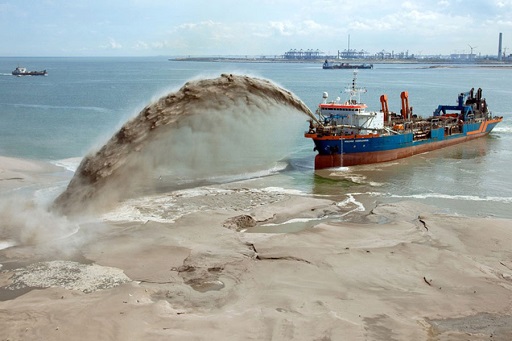4.4 Aggregate extraction
If you live in an area where gravel or sand extraction has occurred, you will know that large areas of land are dug up and huge holes created. Once extraction has ceased, they are allowed to fill with water and can become recreational areas and wildlife parks.
However, in densely populated areas like those found in northern Europe, people do not want their valuable farmland, towns and villages to be dug up for gravel, so much of the extraction occurs in places where people don’t live, so they can’t see the huge scars in the landscape. One of these places is under the sea, whether that is just a few metres offshore, or more usually from a few hundred metres to kilometres offshore.
This sort of extraction occurs in the Atlantic Ocean, North Sea, English Channel, Baltic Sea and Irish Sea. These areas were dry during the glaciations so all the gravel that is found on land is also found under the sea. Although this saves our visible landscape, just because we can’t see it doesn’t mean it isn’t causing environmental damage.
This process of extracting sand and gravel from under the sea is called dredging. There are two main types of dredgers: mechanical dredgers, which rely on some kind of grab or bucket to raise material to the surface; and hydraulic dredgers, which suck a suspension of aggregate and water to the surface. Dredgers can also be stationary or moving. This will determine the area an individual dredging event can affect.
Gravel extraction can have a variety of effects on the marine environment. Damage to habitats is one of the first to come to mind. This leads to biodiversity loss; that is, plants and animals not living where they once did.
There are other problems too:
- Removing sediment from the sea floor can take away a source of material for beach and coastal features, thus increasing coastal erosion.
- Sorting the sediment to remove only gravel and return sand can cause murky waters, reducing light penetration for marine photosynthetic organisms and suffocation of filter feeders.
- Unknown archaeological material could be destroyed.
- Disagreements between the fishing industry and aggregate extraction industry over rights.
- Noise pollution for marine organisms, such as whales and dolphins.
In the next section, you will look at the impacts of dredging in more detail.


